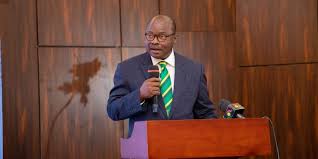The Monetary Policy Committee (MPC) of Ghana’s central bank on Friday announced a 200 basis-point cut in the benchmark policy rate to 27 percent after lowering it to 29 percent in January, as inflation eased five straight months since April.
Bank of Ghana Governor Ernest Addison announced the decision at a press briefing after the 120th MPC meeting, attributing the decision to the lowering of inflation, adding that headline inflation had eased cumulatively by 5.4 percentage points and core inflation by 6.9 percentage points since April.
“These trends suggest that the disinflation process is on course. The latest forecasts show that inflation will continue to ease towards the annual target range of 13 percent and 17 percent for the year,” Addison added.
He said the trends also suggest that inflation would reduce further towards the medium-term target range of 6.0 percent and 10 percent by the end of 2025, barring unanticipated shocks.
“Given these considerations, the MPC decided to lower the policy rate by 200 basis points to 27 percent,” the governor announced.
Generally, Addison noted that macroeconomic conditions have improved with a robust fiscal policy implementation, providing support for growth, while monetary conditions have remained tight to hold inflation at bay.
“The domestic economy continues to recover, evidenced by the stronger than expected GDP outturn for the second quarter of the year,” he added.
He said the committee also expects growth to be strong in the second half of the year, supported by sustained activities in the construction sector, consumption of goods and services by households and firms, as well as exports of gold and crude oil production, as banks continue to extend credit to the private sector.
The external payment position continues to improve, characterized by a higher trade surplus and strong reserve buildup, as gold exports helped to improve the trade surplus and international reserves, complimented by external financial inflows from the IMF and the World Bank, said the governor.
The central bank has maintained a strong monetary policy stance since May 2023 to sustain the lowering of inflation, as reforms backed by a loan of 3 billion dollars from the IMF continue to yield positive results.

